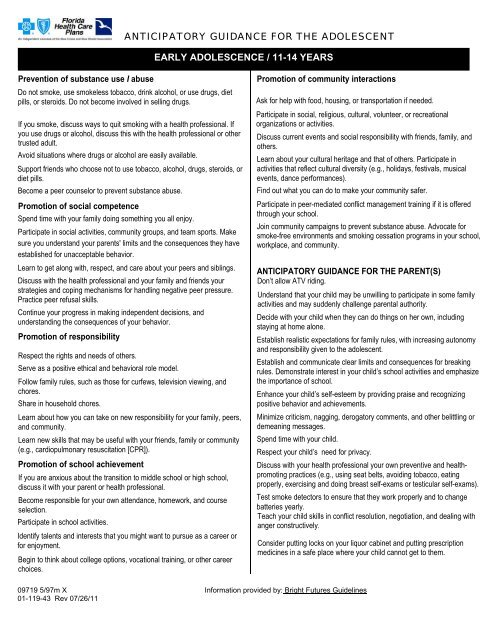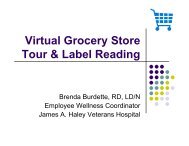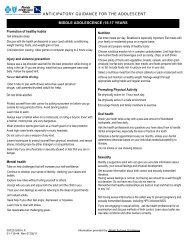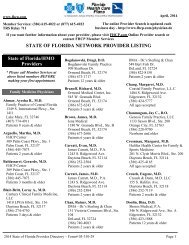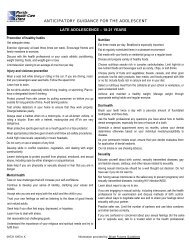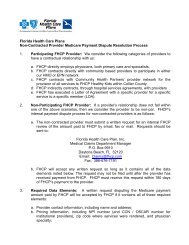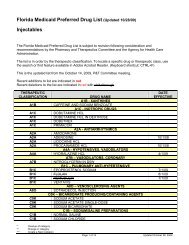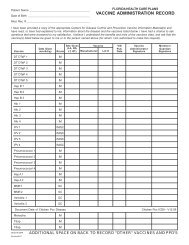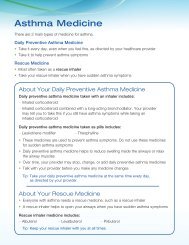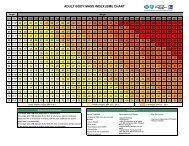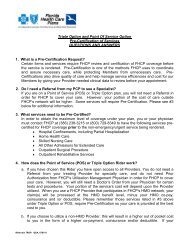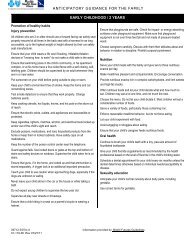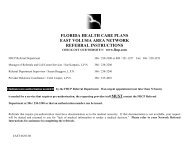ANTICIPATORY GUIDANCE FOR THE ADOLESCENT EARLY ...
ANTICIPATORY GUIDANCE FOR THE ADOLESCENT EARLY ...
ANTICIPATORY GUIDANCE FOR THE ADOLESCENT EARLY ...
You also want an ePaper? Increase the reach of your titles
YUMPU automatically turns print PDFs into web optimized ePapers that Google loves.
<strong>ANTICIPATORY</strong> <strong>GUIDANCE</strong> <strong>FOR</strong> <strong>THE</strong> <strong>ADOLESCENT</strong><br />
<strong>EARLY</strong> ADOLESCENCE / 11-14 YEARS<br />
Prevention of substance use I abuse<br />
Do not smoke, use smokeless tobacco, drink alcohol, or use drugs, diet<br />
pills, or steroids. Do not become involved in selling drugs.<br />
If you smoke, discuss ways to quit smoking with a health professional. If<br />
you use drugs or alcohol, discuss this with the health professional or other<br />
trusted adult.<br />
Avoid situations where drugs or alcohol are easily available.<br />
Support friends who choose not to use tobacco, alcohol, drugs, steroids, or<br />
diet pills.<br />
Become a peer counselor to prevent substance abuse.<br />
Promotion of social competence<br />
Spend time with your family doing something you all enjoy.<br />
Participate in social activities, community groups, and team sports. Make<br />
sure you understand your parents' limits and the consequences they have<br />
established for unacceptable behavior.<br />
Learn to get along with, respect, and care about your peers and siblings.<br />
Discuss with the health professional and your family and friends your<br />
strategies and coping mechanisms for handling negative peer pressure.<br />
Practice peer refusal skills.<br />
Continue your progress in making independent decisions, and<br />
understanding the consequences of your behavior.<br />
Promotion of responsibility<br />
Respect the rights and needs of others.<br />
Serve as a positive ethical and behavioral role model.<br />
Follow family rules, such as those for curfews, television viewing, and<br />
chores.<br />
Share in household chores.<br />
Learn about how you can take on new responsibility for your family, peers,<br />
and community.<br />
Learn new skills that may be useful with your friends, family or community<br />
(e.g., cardiopulmonary resuscitation [CPR]).<br />
Promotion of school achievement<br />
If you are anxious about the transition to middle school or high school,<br />
discuss it with your parent or health professional.<br />
Become responsible for your own attendance, homework, and course<br />
selection.<br />
Participate in school activities.<br />
Identify talents and interests that you might want to pursue as a career or<br />
for enjoyment.<br />
Begin to think about college options, vocational training, or other career<br />
choices.<br />
Promotion of community interactions<br />
Ask for help with food, housing, or transportation if needed.<br />
Participate in social, religious, cultural, volunteer, or recreational<br />
organizations or activities.<br />
Discuss current events and social responsibility with friends, family, and<br />
others.<br />
Learn about your cultural heritage and that of others. Participate in<br />
activities that reflect cultural diversity (e.g., holidays, festivals, musical<br />
events, dance performances).<br />
Find out what you can do to make your community safer.<br />
Participate in peer-mediated conflict management training if it is offered<br />
through your school.<br />
Join community campaigns to prevent substance abuse. Advocate for<br />
smoke-free environments and smoking cessation programs in your school,<br />
workplace, and community.<br />
<strong>ANTICIPATORY</strong> <strong>GUIDANCE</strong> <strong>FOR</strong> <strong>THE</strong> PARENT(S)<br />
Don’t allow ATV riding.<br />
Understand that your child may be unwilling to participate in some family<br />
activities and may suddenly challenge parental authority.<br />
Decide with your child when they can do things on her own, including<br />
staying at home alone.<br />
Establish realistic expectations for family rules, with increasing autonomy<br />
and responsibility given to the adolescent.<br />
Establish and communicate clear limits and consequences for breaking<br />
rules. Demonstrate interest in your child’s school activities and emphasize<br />
the importance of school.<br />
Enhance your child’s self-esteem by providing praise and recognizing<br />
positive behavior and achievements.<br />
Minimize criticism, nagging, derogatory comments, and other belittling or<br />
demeaning messages.<br />
Spend time with your child.<br />
Respect your child’s need for privacy.<br />
Discuss with your health professional your own preventive and healthpromoting<br />
practices (e.g., using seat belts, avoiding tobacco, eating<br />
properly, exercising and doing breast self-exams or testicular self-exams).<br />
Test smoke detectors to ensure that they work properly and to change<br />
batteries yearly.<br />
Teach your child skills in conflict resolution, negotiation, and dealing with<br />
anger constructively.<br />
Consider putting locks on your liquor cabinet and putting prescription<br />
medicines in a safe place where your child cannot get to them.<br />
09719 5/97m X Information provided by: Bright Futures Guidelines<br />
01-119-43 Rev 07/26/11


